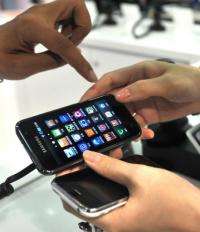Apple rivals hit back at Jobs' antenna claims

Smartphone makers Blackberry, Samsung and HTC on Tuesday rejected claims by Apple chief Steve Jobs that other smartphones have antenna problems similar to those reported with the latest iPhone model.
The three rivals to Apple reacted after Jobs highlighted their devices at a presentation on Friday, saying other smartphones had similar antenna difficulties to the iPhone 4
Some users of Apple's newest gadget have complained that they lose reception when covering the lower left corner of the phone in what has been referred to as a "death grip".
The problem is caused by an unusual antenna that wraps completely around the iPhone 4. Apple offered free cases to customers to help remedy the problem.
Aiming to demonstrate the iPhone is not the only smartphone that loses signal strength when gripped a particular way, Jobs displayed a video of tests with devices from Canada's RIM, Taiwan's HTC and South Korea's Samsung.
Apple also created an online page on "smartphone antenna performance" at Apple.com/antenna showing the tests with RIM's Blackberry Bold 9700, the HTC Droid Eris and the Samsung Omnia II.
However Samsung said Tuesday: "Based on years of experience of designing high-quality phones, Samsung mobile phones employ an internal antenna design technology that optimises reception quality for any type of hand-grip use."
Samsung officials added there had been no major customer complaints about the reception of the Omnia II.
Mike Lazaridis and Jim Balsillie, the co-chief executives of RIM, said: "Apple's attempt to draw RIM into Apple's self-made debacle is unacceptable."
"Apple's claims about RIM products appear to be deliberate attempts to distort the public's understanding of an antenna design issue and to deflect attention from Apple's difficult situation," they said.
The RIM CEOs said their company "is a global leader in antenna design and has been successfully designing industry-leading wireless data products with efficient and effective radio performance for over 20 years.
"One thing is for certain, RIM's customers don't need to use a case for their BlackBerry smartphone to maintain proper connectivity," they said.
Taiwan's HTC Corp joined in rejecting Jobs' claims, saying its engineers had overcome antenna problems in designing its smartphones.
"It is well understood by the industry that if enough of a phone and its antenna is covered, the RF (radio frequency) signal will be attenuated to some extent," the company said in a statement.
"At HTC, we carefully engineer our phones to ensure that this effect is minimized in real-world use.... The results of this customer-centric approach can be seen in the satisfaction of our customers."
Jobs on Friday acknowledged the iPhone 4 drops slightly more calls than the previous version of the smartphone, the iPhone 3GS, but said the issue had been "blown so out of proportion that it's incredible."
(c) 2010 AFP




















